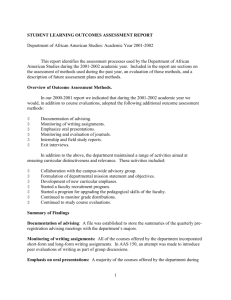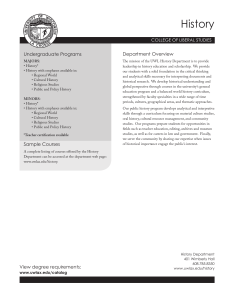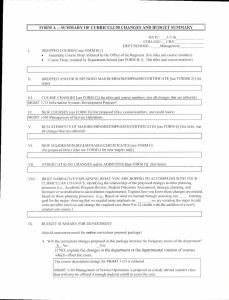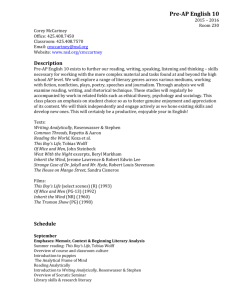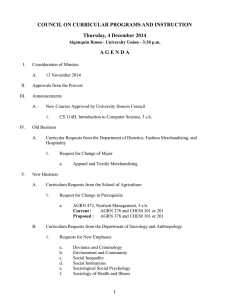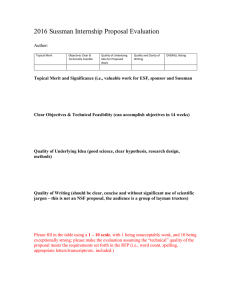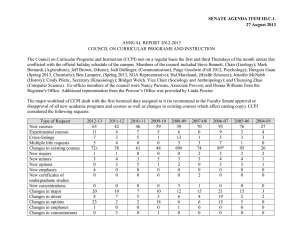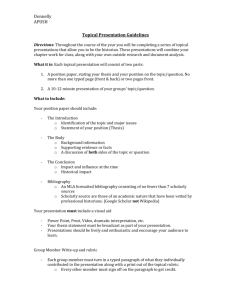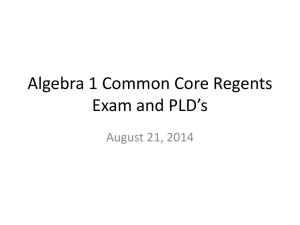Cover Memo Proposal from the History Department:
advertisement
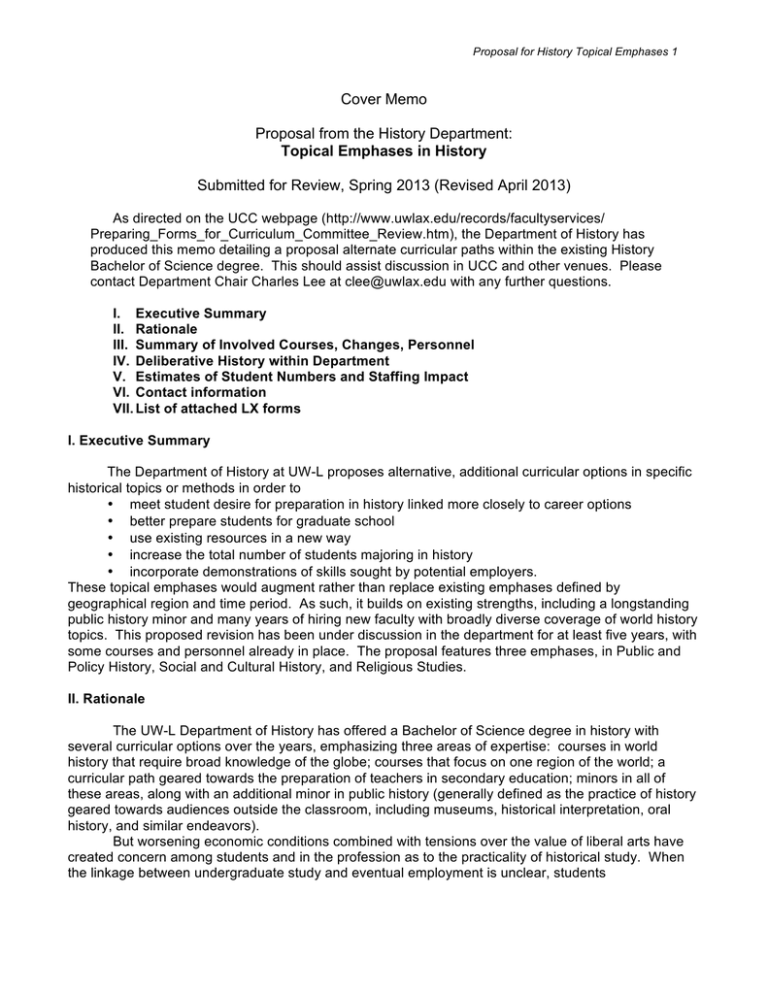
Proposal for History Topical Emphases 1 Cover Memo Proposal from the History Department: Topical Emphases in History Submitted for Review, Spring 2013 (Revised April 2013) As directed on the UCC webpage (http://www.uwlax.edu/records/facultyservices/ Preparing_Forms_for_Curriculum_Committee_Review.htm), the Department of History has produced this memo detailing a proposal alternate curricular paths within the existing History Bachelor of Science degree. This should assist discussion in UCC and other venues. Please contact Department Chair Charles Lee at clee@uwlax.edu with any further questions. I. Executive Summary II. Rationale III. Summary of Involved Courses, Changes, Personnel IV. Deliberative History within Department V. Estimates of Student Numbers and Staffing Impact VI. Contact information VII. List of attached LX forms I. Executive Summary The Department of History at UW-L proposes alternative, additional curricular options in specific historical topics or methods in order to • meet student desire for preparation in history linked more closely to career options • better prepare students for graduate school • use existing resources in a new way • increase the total number of students majoring in history • incorporate demonstrations of skills sought by potential employers. These topical emphases would augment rather than replace existing emphases defined by geographical region and time period. As such, it builds on existing strengths, including a longstanding public history minor and many years of hiring new faculty with broadly diverse coverage of world history topics. This proposed revision has been under discussion in the department for at least five years, with some courses and personnel already in place. The proposal features three emphases, in Public and Policy History, Social and Cultural History, and Religious Studies. II. Rationale The UW-L Department of History has offered a Bachelor of Science degree in history with several curricular options over the years, emphasizing three areas of expertise: courses in world history that require broad knowledge of the globe; courses that focus on one region of the world; a curricular path geared towards the preparation of teachers in secondary education; minors in all of these areas, along with an additional minor in public history (generally defined as the practice of history geared towards audiences outside the classroom, including museums, historical interpretation, oral history, and similar endeavors). But worsening economic conditions combined with tensions over the value of liberal arts have created concern among students and in the profession as to the practicality of historical study. When the linkage between undergraduate study and eventual employment is unclear, students Proposal for History Topical Emphases 2 understandably are dubious about choosing to pursue a degree in history. This has resulted in a declining number of students majoring in history over the last decade. This proposal does not abandon the emphases of liberal education but is intended to provide meaningful connections between the study of history and paths in post-graduation life that do not necessarily require students majoring in history to teach in secondary education. By emphasizing topical and methodological approaches to history, this proposal facilitates transition into careers outside of academia, as well as paths to graduate school and religious study. Additionally, these proposed emphases do not require a separate or dedicated faculty who could not also engage in the other curricular paths of the department. While existing needs in the general education world history survey course have required the hiring of a broad swath of faculty with expertise in different regions and time periods, those faculty who have already been hired and who will be hired in the future also have expertise in methods and topics with which they examine those periods and regions. This proposal re-uses the existing specialties, methodologies and interests of faculty already in the department because of their coverage of time and place to serve the additional topical emphases; it also allows faculty who are hired in support of the new emphases to nevertheless share interests and responsibilities in existing world history majors with veteran faculty. As such, it might be useful to think of this proposal as a different way to slice an already-existing cake. These proposed topical emphases would also serve the existing departmental mission, which states that “We develop historical understanding and global perspective through courses in the University’s General Education program and a balanced world history curriculum, strengthened by faculty specialties in a wide range of time periods, cultures, geographical areas, and thematic approaches.” The proposed emphasis would bolster attention to that last item, “thematic approaches,” which are not currently reflected in curricular offerings. Furthermore, the proposal reinforces the importance placed in the mission statement on developing “analytical and interpretive skills through a curriculum focusing on material culture studies, oral history, cultural resource management, and community studies.” The goal of more closely connecting undergraduate study with career paths and demonstrating skills valued by employers is a component of all three emphases. These tracks all require the creation of a portfolio of written work based on coursework but geared towards demonstrating writing and critical judgment skills valued by employers and graduate programs. This portfolio will be tailored for each emphasis, but will probably include sample CVs, cover letters, examples of student work and the like. Each emphasis also includes an internship/field experience option to put students in direct contact with cultural institutions, museums, or non-profits appropriate for their emphasis. Individually, the social and cultural emphasis works to place the student’s study of social and cultural institutions in historical context, coupling it with the skill set needed for employment in non-profit and community advocacy sectors. The idea is that a grounding in the history of how people form community ties, fight for their rights, or represent group identity would prepare a student to take on those type of working-with-thecommunity, community-government liaison, social interest group roles in 21st century world. The religious studies emphasis would prepare students with broad knowledge of religious forms and institutions, to go on to graduate studies, non-profit work, or divinity schools. The public and policy track would prepare students with a broad knowledge of many types of employment or graduate work in history that is not directly related to history education in the classroom. Teacher education students would not be eligible for any of these topical emphases; existing curricular options specifically tailored for their needs already exist in the department, and these new topics would emphasize methods, approaches, and career or graduate-education options as alternatives to employment within primary and secondary education. As the approach to topics and methods within history described in this proposal has overlap with academic treatment of these same topics outside of the discipline, these emphases include opportunities for students to count interdisciplinary work from other departments on the UW-L campus towards their history major. Where appropriate, the UW-L history department has consulted with these departments during the planning process. Proposal for History Topical Emphases 3 III. Summary of Involved Courses, Changes, Personnel This initiative requires the creation of three new 40-credit topical emphases with the history major, and three new 20-credit topical emphasis minors. It also requires the elimination of the alreadyexisting minor in public history, which will be superseded. The three emphases, topics, or tracks, from which students might choose include Public and Policy history, Social and Cultural History, and Religious Studies. Specific descriptions of the emphases are included in the attached LX-138Ps, while a full list of all attached forms is in section VII of this document. The new topical emphases include 12 new courses and the modification of two existing courses at this time, with LX forms for most included in this package. Many of these courses have been proposed as part of the rotations of new faculty hired in the last seven years. Of these, one course that was conceived as serving the new major (HIS-391) has already been approved by the UCC and was taught Fall 2012. One course (HIS-407: State and Society) serves two emphases. Four of the 12 total courses are courses proposed by new faculty who began employment at UWL in Fall 2012. The rationale for hiring and job description for these faculty included contributions to this planned major. In addition, three new hires – to begin Fall 2013 – with expertise in education and social policy will likely contribute to one or more of the emphases. These topical emphases exist within the longstanding framework of courses and curricular development within the History Department. Therefore, the three topical emphases include existing “core” history courses, including 200-level surveys of world regions, the HIS-200 introduction to the history profession, the HIS-490 senior seminar, the existing 400-level internship or field experience course, and a number of the existing 300-level “Category III” world or regional history classes. Other extant courses from the department have also been included as electives where appropriate; in particular, the Religious Studies track is based almost exclusively on already-existing classes, which have been taught in the department for many years. In addition, the proposed topics allow the listing of a maximum of six credits from selected courses outside the department, including both treatment of those topics from a different disciplinary perspective and technical “skills”-centered courses appropriate to future employment. IV. Deliberative History within Department This proposal has been extensively discussed within the history department. The department curriculum committee suggested creating a “thematic” category to augment existing majors in the September 26, 2008. At that time, this plan was a part of a proposal for a Master’s degree, which was the work of an ad-hoc committee. After receiving negative feedback about the possibility of a Master’s degree in spring 2009, the idea of a thematic category added to the existing regional emphases was transformed into a proposal for stand-alone topical emphases. This proposal was discussed in the September 16, 2009 faculty meeting, and an ad-hoc committee was organized during the fall of 2009. The first iteration of this plan contained “Policy” and “Cultural Studies” as topics. The November 23, 2009 department meeting included discussion and a unanimous vote to approve a new “topical” approach with four emphases. The department distributed assignments to write LX’s for the new topical emphases at a department meeting February 4, 2010. Discussion of the proposal was part of the description of faculty written in Fall, 2011, with the faculty subsequently hired in spring, 2012. The description of need in public and policy history was a part of a “need” document in support of an additional GQA position submitted, but not granted, in Fall 2012. The most recent department vote in support of this planning process, with the three proposed topics of public and policy, social and cultural, and religious history, was December 12, 2012. Faculty members resolved to complete LX forms by Spring 2013, and the resulting documents were circulated to impacted departments in February and March of 2013. The proposal was approved by the College of Liberal Studies Academic Programs Committee on April 3, 2013. The CLS APC suggested at that time that the department of history consult with Registrar Chris Bakkum to clarify that this proposal would not require a new program code, and does not constitute a “new major” or program but rather is a new curricular path within the existing Bachelor of Science degree in History at UW-L. This April revision of the cover memo reflects that language, but the LX forms remain unchanged. Proposal for History Topical Emphases 4 V. Estimates of Student Numbers and Staffing Impact History faculty believe that a reasonable estimate of students lies between five and fifteen students enrolling in the topical emphases per year, per emphasis, totaling between fifteen and fortyfive additional students majoring in history per year. That is, the addition of these tracks should, as a measure of success, contribute an additional 15 to 45 students to the average yearly number of students majoring in existing programs. As a small number of students minoring in public history already exist, creating the new public and policy track will already be close to the minimum target of five new students majoring in history per year for that track. Some rough calculations of demand are possible. Imagining that students majoring in history would take, at maximum, four three-credit history courses over the course of an academic year (in order to reach the sum of their 40 credits over four or more years), then the additional 15 to 45 students would require, at maximum, 60 to 180 seats in upper-division courses. With an upper-division course cap currently estimated at 35, there would need to be at least two and more likely five additional upperdivision courses scheduled in order to support this demand, in a worst-case (best-case?) scenario of 45 additional majors per year. Furthermore, each of the three tracks would, at absolute minimum, need to offer at least one course in that track per semester, and preferably two, in order to cater to student scheduling pressure and to successfully move students toward completion. This would require some number of additional, or at least other upper division courses than are currently offered. A number of mitigating factors of the plan limit the demand placed on faculty, including the opportunity for students in all three tracks to count interdisciplinary credits from other departments, the fact that many existing upper division courses are currently under-enrolled (which demonstrates unused capacity to absorb additional students into upper-division courses), and the cross-listing of courses within multiple emphases and tracks (including already-existing courses which will now count towards the new topical emphases). Furthermore at least some of the new students majoring in the topical tracks will not be additional history majors, but pulled from already-existing programs and the public history minor, and thus would not represent an increased demand on faculty. (These already-existing curricular programs will not be overly impoverished, however, as the largest source of students majoring in history -- education students -- are not eligible to take the new “topical” emphases.) On top of these mitigating factors, the history department has successfully hired several new faculty members over the last eight years. This hiring, partly under GQA, has brought down faculty workload from previous highs to currently manageable levels. Impact on staffing would also be manageable for the reason outlined in the “Rationale” section: existing faculty hired for their regional or temporal coverage for world history courses also are able to contribute to the new thematic emphases. That is to say, historians generally have expertise in both a time and place, and a method with which to study that time and place (or a thematic concern that crosses temporal and physical boundaries). For example, a faculty member specializing in the cultural history of early modern Europe could offer classes in methods and approaches of cultural history and in the general history of early modern Europe (or Italy or Spain, etc.). Therefore, new and existing faculty can serve new and extant courses. Based upon these estimates and plans, it is believed that sufficient personnel currently are employed in the department to teach these numbers of additional students. Beyond that, the new topical emphases do not require any significant investment in specialized equipment or facilities, though small grants may be required to support teaching innovation in particular instances. While it is believed that the history department currently has sufficient personnel to support this proposal, it is still possible that unforeseen demand or student preference might necessitate further hiring in the future to expand this program beyond current plans. Proposal for History Topical Emphases 5 VI. Contact information Department Chair Charles Lee, clee@uwlax.edu VII. List of attached LX forms LX-138P History Major with Topical Emphasis LX-138P History Minor with Topical Emphasis LX-138P (Eliminating the existing Public History Minor) New Courses LX-138C/139 HIS-393 Material Culture LX-138C/139 HIS-397 Social History of African Nationalist Movements LX-138C/139 HIS-398 Social History of Colonial Africa LX-138C/139 HIS-403 Exhibition Design and Development LX-138C/139 HIS-401 History and Japanese Religions LX-138C/139 HIS-404 Migration and Empire LX-138C/139 HIS-405 Migration: Personal Accounts LX-138C/139 HIS-406 Topics in Social History LX-138C/139 HIS-407 State and Society LX-138C/139 HIS-412 Global Trade and Labor, 1500-Present LX-138C/139 HIS-413 Topics in Cultural History Alterations to Existing Courses LX for HIS-320, Introduction to Public and Policy History LX for HIS-450, Internship / Field Experience
